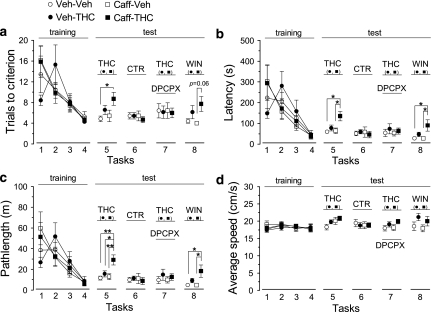Figure 6.
Influence of chronic caffeine administration, and involvement of the adenosine A1 receptors, upon the acute effects of Δ9-tetrahydrocannabinol (THC) and WIN55,212-2 on mice tested in a short-term spatial memory task. Caffeine was given daily (3 mg/kg, >12 h before trials), for 15 days before testing the effect of THC (see Methods). (a–d) Mice familiarized with the escape strategies during the first 4 tasks (training) and all groups showed improved performance in (a) the number of trials to reach criterion, (b) the escape latency, and (c) swim pathlength, whereas (d) average swim speed remained constant. THC (5 mg/kg), or vehicle, was tested in the absence (task 5) and in the presence (task 7) of DPCPX (1 mg/kg). A control (CTR) test in the absence of acute drugs was performed at task 6 to measure whether performance levels returned to baseline values. Subjects rested for one day off drug after each test task, to allow full metabolization of THC. The effect of WIN55,212-2 (WIN, 1 mg/kg), or vehicle, was tested at task 8. For clarity of comparison between groups, symbols were nudged in tasks 5–8. Note that chronic caffeine exacerbated the spatial memory deficits induced by acute THC and WIN. The effect of THC was prevented by the previous administration of DPCPX. All data represent mean±standard error of mean (SEM) of n=7. *p<0.05, **p<0.01, two-way analysis of variance, followed by Tukey's post hoc tests (see text for more details).

